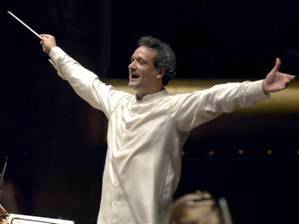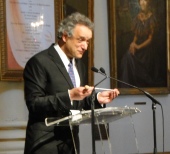
Introducing Louis Langrée, Cincinnati's Lucky 13
If there is a word to describe conductor Louis Langrée,
it is eloquent. Eloquent on the podium, as
in his two stirring appearances as guest conductor of the Cincinnati Symphony
Orchestra last season. And eloquent in words,
as spoken at the press conference introducing him as CSO music director
designate April 20 in the foyer of Music Hall (webcast live).

French born Langrée, 51, succeeds music director laureate Paavo Järvi, who stepped down in May, 2011. His tenure will begin with the 2013-14 season, when he will become the 13th music director in the CSO’s 117-year history. Interestingly, the two conductors are exchanging cities. Järvi is now music director of the Orchestre de Paris. Langrée, a native of Mulhouse in the Alsace region of France, lives in Paris with his wife and two children (Langrée was also once assistant conductor of the Orchestre de Paris).
After being introduced at the press conference by Melody
Sawyer Richardson, president of the CSO board of trustees, Langrée
emerged from the auditorium and hugged and kissed everyone in sight. CSO concertmaster Timothy Lee presented him
with a baton, which he held up and then waved to signal the crowd of CSO supporters,
staff and media, who were standing and applauding, to take their seats.

He presented a bottle of Alsatian Grand Cru wine to Lees, then gushed “I am so thrilled, so deeply happy, so privileged and so honored, first to succeed to Paavo, who is an amazing conductor, and to this amazing list of music directors that you already had.” But that was just a flourish. Where Langrée communicated most profoundly was on the subject of music itself.
He spoke of the cab driver who brought him from the airport when he first came to Cincinnati In February, 2011. When Langrée told him he was in town to conduct the CSO, the driver replied, “That’s an amazing orchestra,” Langrée said. “I thought this guy was going every week to listen to the orchestra. He never had, but he told me, ‘I know they are great.’ The next step is he should come and listen to a concert, but he told me, ‘I don’t like music that much. I prefer sports.’
“Which is fine,” Langrée told the crowd. “But actually the question is not about ‘liking’ music or not. Music is essential for our life. Do we like the water we drink? Do we like air? We don’t think about it. It’s just essential, and music is the same. In every important moment of life, birth, marriage, funerals or when the Reds team (Cincinnati Reds) is winning, people sing. They don’t question, do I like music or not? It’s just inevitable, it’s necessary, it’s natural.”
In an interview the following day in his soon-to-be-office at Music Hall, Langrée expanded on music, the CSO and its mission, how he became a conductor, on the exciting “Renaissance” taking place in Over-the-Rhine (and on Graeter’s black raspberry chocolate chip ice cream – “so good”).
Currently music director of New York’s Mostly Mozart Festival at Lincoln Center, a regular conductor at the Metropolitan Opera and the Vienna State Opera, chief conductor of the Camerata Salzburg (an Austrian chamber orchestra) and a busy guest conductor around the world, Langrée has had opportunities to take on major music directorships before. Why the CSO? And why now?
“First of all, the level of the orchestra,” he said. “It’s a really great orchestra. Also the spirit of the musicians as a group. As an individual is one thing, as a group is different. And I feel that so many people care about the orchestra -- the musicians, the board members and the staff. Some places you go and see people working in the orchestra because the job was open there, and it would be the same thing if it would be in a bank or somewhere. Here, you have a feeling they share the same goal and pride, and that’s rare.”
Why now?
“It’s so exciting now because of all the ‘revitalization,’” he said. “It’s exciting to me that the concert hall is in the middle of this Over-the-Rhine Renaissance project. That music or art is in the middle of that is fantastic.” (“I come also from a place Over the Rhine in Alsace,” he told the press conference crowd.)
Regarding the quality of the CSO, “For so many American orchestras, it’s a little bit like your skyscrapers. The view is very vertical,” he said. “You care about attack and brilliance. It’s very, very noticeable. You listen to a recording and you say, oh, that’s an American orchestra. And I say that with a lot of admiration. Here you have this care of shape, this care of phrasing, this care of meaning.”
To demonstrate, Langrée went to the piano to play the opening of Brahms’ First Symphony (with which he made his CSO debut last season). “You can’t play Brahms First like Brahms Second or Brahms Third. It has a special meaning, a special dramaturgy. There is a structure, a tension. You can’t speak about those things with all orchestras, but they (the CSO) played it like that. And having heard some CDs of French music with Paavo, his Debussy, Ravel, ‘Symphonie fantastique’ (Berlioz), wow, that’s good.”
Langrée’s music education began at home, he said. “It was no question of not doing music. My father is an organist (now 85). He taught me piano, he taught me counterpoint and harmony. Music was something very serious. I now realize how much I owe to him. Without him, I would not be a musician. Of course, when you are ten years old and you have to do some counterpoint exercises, and you hear your friends playing soccer, you want to do that.”
A graduate of the Strasbourg Conservatory, he began as a pianist. “I much preferred playing chamber music with friends and also Liederabend and Melodie (evenings of song). A friend told me that the great Melodie and Lieder singers are also opera singers. He told me if you want to meet great singers, work in the opera.” Langrée began working as a vocal coach for Opéra National de Lyon in 1983. “That was the year when John Eliot Gardiner started the Orchestre de l’ Opéra Lyon. I was engaged as a pianist, but every five minutes I had free, I went to watch rehearsals. I was fascinated by the orchestra, by the fact that this group of different ages, countries, cultures, temperament -- all of that -- suddenly speaks one voice. It still continues to mesmerize me.”
Then one day an assistant at the Opéra had to withdraw from a production. “They told me, you’re always spying in the rehearsal, would you like to be assistant for this production?” The conductor was Semyon Bychkov. “Semyon, I remember very well, told me, ‘Be careful, because if you are a conductor, if you start now, you won’t be able to stop. It’s like a drug. It will be your life.’ And he was so right.”
When Bychkov became music director of the Orchestra de Paris, he asked Langrée to be assistant conductor (1989-92). “I was so lucky. I assisted James Conlon and played piano rehearsals with Boulez, Carlo Maria Giulini and Zubin Mehta. I learned so many things.” Later, he served as music director of the Orchestre de Picardie, Orchestre Philharmonique de Liège, Opéra National de Lyon and Glyndebourne Touring Opera. He became music director of the Mostly Mozart Festival in 2002.
“I never took proper conducting lessons, which, I think, at the end, can be a strength, because you have to discover everything by experience,” Langrée said. “There is this wonderful phrase – it’s the name of a book about Pierre Boulez – which I think is so true, ‘Par volonté et par hasard’ (“By will and by chance”). There are so many chances, like meeting Semyon because the assistant was not able to make it. Then you need volonté, you need to work.”
Langrée feels it is his mission and that of the CSO to involve the community. “Otherwise, you just make beautiful sound, but to say what to whom? To share what? Music is not a supplement of soul or something. It’s part of the expression of life and therefore part of the community.” He denies that classical music is not relevant to people’s lives. Again, he went to the piano and played harmonies that instantly convey particular feelings. “It’s all music in life. You just have to open your heart and your sensitivity and your sensibility.”
Langrée will conduct two concerts during the CSO’s 2012-13 season at Music Hall, an all-French program Nov. 9 and 10 featuring the Symphony in D Minor by Cesar Franck and Saint-Saëns’ Piano Concerto No. 2 with guest artist Cédric Tiberghien, and Beethoven’s Ninth Symphony Nov. 15 and 17 with the May Festival Chorus. He will conduct six concerts in 2013-14, his first year as music director, and 10 each year thereafter for the duration of his four-year contract. He is heavily booked, he said, partly because of opera, which is scheduled far in advance. “I know what I will do at the Met in 2015.” Still, he has moved from being an “opera conductor sometimes conducting concerts,” as at the beginning of his career, to “just the opposite. I am a symphony conductor sometimes conducting opera.” He will conduct nine concerts at the Mostly Mozart Festival this summer at Lincoln Center (July 28-August 25). Information at http://mostlymozart.org
Busy career or not, Langrée makes time for his family. He and his wife Aimée Frank Langrée, a writer for French television, live in Paris with their daughter Céleste, 12, and son Antoine, 10. When he is on the road, he stays in touch with them via Skype. “We eat together. I have room service, and I help them with their homework. I show them my room. Of course, it’s frustrating, because now we need 3D or something where we can hug each other.”
Langrée said that he plans to have a home in Over-the-Rhine, which he loves. “I have conducted some great orchestras in places where downtown is a desert after offices close and people live only in suburbs. I remember having asked the doorman at a hotel, ‘Where can I buy a banana?’ (He eats a banana before concerts.) He said, ‘We have a driver who will take you to the mall. It’s only 20 minutes by car.’ You had to go out of the city to those rich ghettos with the huge malls. It was fascinating and at the same time, I felt this is not my life. This is not for me. Here, there are people downtown that live in those houses. Also, the architecture reminds me of Germany. I feel home a little bit. If you feel in exile, you’d better not start.”
For information about the 2012-13 CSO season, visit www.cincinnatisymphony.org